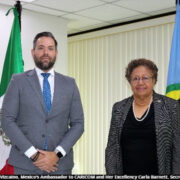FAO Director-General addresses the launch of the Early Warnings initiative for the Caribbean
Black Immigrant Daily News
The Director-General of the Food and Agriculture Organization of the United Nations (FAO), QU Dongyu, on Monday addressed the launch in Bridgetown, Barbados of the Executive Action Plan for the Early Warnings for All Initiative (EW4ALL) for the Caribbean, an event designed to mobilize support among the region’s governments for a UN plan that helps protect people and assets from the growing number of natural disasters in a relatively cheap and effective way.
The event enjoyed the support and leadership of the Prime Minister of Barbados Mia Mottley and the Prime Minister of Saint Lucia Philip J. Pierre.
The Deputy Secretary-General of the United Nations, Amina J. Mohammed, also delivered a keynote address to the regional launch of EW4ALL, a UN initiative unveiled during last November’s COP27 climate change conference in Sharm el-Sheikh, Egypt.
Speaking in Bridgetown, the Director-General called on the Caribbean region to “build up more sustainable agrifood systems.”
FAO has a 10-year strategic framework on “how to transform agrifood systems together” to make them “more efficient, more inclusive, more resilient, more sustainable for better production, better nutrition, better environment, better life, leaving no one behind,” Qu said.
With its wealth of expertise on early warning systems and risk-informed anticipatory action, as well as its presence in more than 130 countries, FAO can play a key role in helping protect agricultural livelihoods and support local food production ahead of forecast shocks.
Between 2008 and 2018, the agriculture sector (including crops, livestock, forestry, fisheries and aquaculture) absorbed 26 percent of the overall impact caused by medium- to large-scale disasters in low- and lower-middle-income countries.
And Small Island Developing States (SIDS) such as Barbados, where the meeting was held, are particularly exposed. Over that same period, disaster-related loss recorded in crop and livestock production across the Caribbean SIDS amounted to $8.7 billion, corresponding to about 14 percent of potential production, according to FAO data.
FAO’s role
Since 2016, FAO has been among the pioneering agencies in anticipatory action and has helped more than 40 countries link early warnings to anticipatory action to protect the agricultural livelihoods and food security of the most vulnerable people.
FAO also provides key global early warning services and tools such as the Global Information and Early Warning System on Food and Agriculture (GIEWS), the Joint FAO-OIE-WHO Global Early Warning System for health threats and emerging risks at the human-animal-ecosystems interface (GLEWS), the Desert Locust Watch, and the Predictive Livestock Early Warning Information System (PLEWS), among others.
It also produces forward-looking analyses focusing on acute food insecurity such as the FAO-WFP Hunger Hotspots report.
In 2021 alone, FAO provided support to over 90 countries to strengthen disaster and food security risk-related early warning systems.
In particular, GIEWS has been active in the early warning on food and agriculture, for almost 50 years, and stands ready to support the Early Warning 4 ALL Initiative in the Caribbean.
The need for inclusive and accessible multi-hazard early warning systems is urgent as the number of recorded disasters has increased five-fold, driven in part by human-induced climate change and more extreme weather, as well as, by other hazards such as earthquakes, tsunamis, and more recently pandemics.
Early warning systems are widely regarded as a relatively cheap and effective way of protecting people and assets. For instance, studies from Sudan to Mongolia show that for every $1 invested in anticipatory actions, families can gain up to $7 in benefits and avoided losses.
By predicting where hazards will hit and deploying resources when people and their assets can still be saved, anticipatory action is more effective and more dignified, as it provides people with the means to save their livelihoods before they are wiped out and need to be rebuilt.
“Together we can go far and we can go better,” the Director-General said.
Donate At Caribbean News Service, we do not charge for our content and we want to keep it that way. We are seeking support from individuals and organisations so we can continue our work & develop CNS further.
NewsAmericasNow.com





